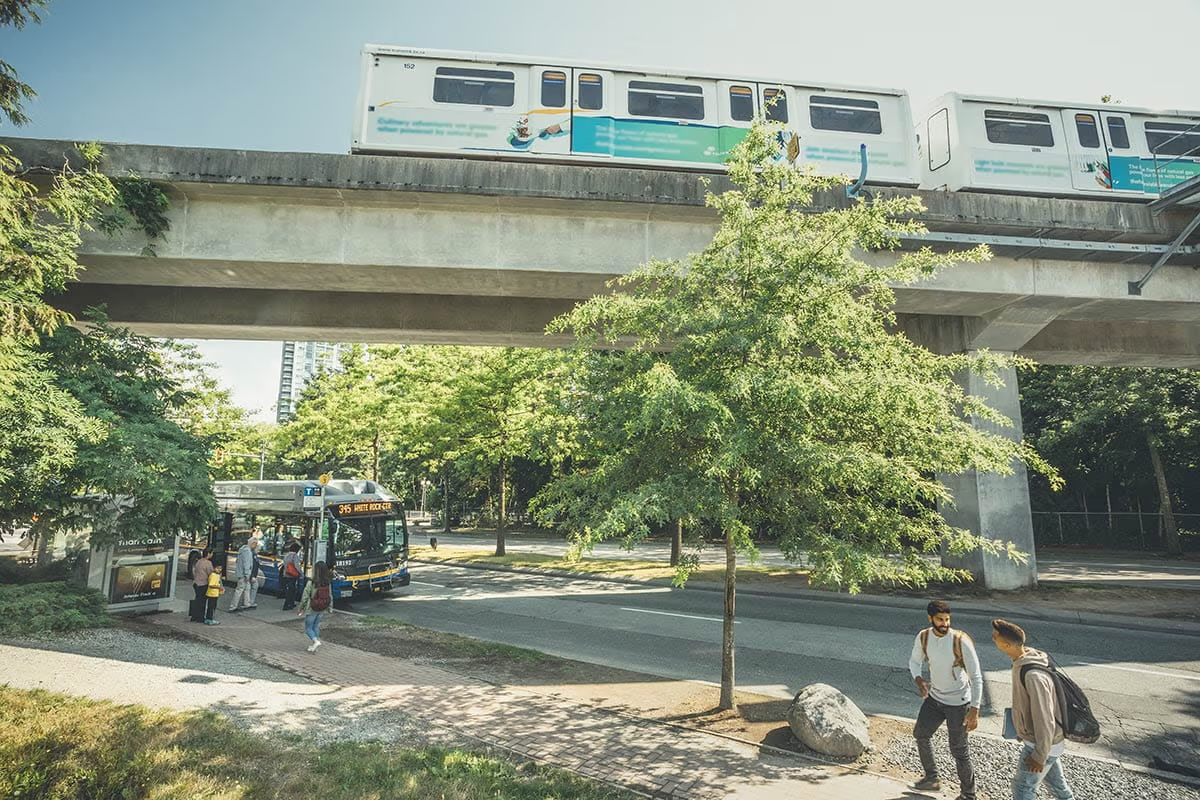10-Year Investment Plan

Under the South Coast British Columbia Transportation Authority Act, TransLink must prepare a 10-Year Investment Plan at least once every three years. The Investment Plan identifies proposed transportation services, key initiatives, and capital investments, and details how these services, initiatives, and investments will be funded. Once approved, the 10-Year Investment Plan becomes the new strategic plan that will move the region towards the goals in the Regional Transportation Strategy.
2025 Investment Plan
Each week, one third of Metro Vancouver’s population relies on TransLink’s transit network to move them through the region. A robust transportation system is critical to supporting a resilient economy, and a thriving region. It also helps grow businesses and productivity, address housing affordability challenges by supporting complete communities, and is an essential contributor to reducing GHG emissions.
The 2025 Investment Plan expands bus service, reduces overcrowding, and advances early priorities in the Access for Everyone Plan, while preventing any cuts to transit services by funding TransLink operations through the end of 2027.
Key priorities in the 2025 Investment Plan include:
- The largest increase in bus service since 2018, beginning as early as September 2025, including:
-
Increased service on 50 bus routes to address overcrowding
- 40 new or improved routes to support transit-oriented communities, industrial areas, as well as neighbourhoods with limited or no transit services
-
Seven new or improved seasonal services to parks and beaches
-
Extending the North Shore’s R2 RapidBus to Metrotown by 2027
-
Design work for three BRT corridors
-
Additional HandyDART trips in response to growing ridership
-
Adding West Coast Express train cars to address customer demand
-
Increased rehabilitation funding for the Major Road Network, including funding to address road deterioration in many areas of the region
-
Continuing investments in local active transportation and bus priority infrastructure, improving bus service delivery speed and cost-efficiency
Over the past several years, TransLink has been facing a structural deficit of more than $600 million annually due to a shortage of operating funding caused primarily by declining fuel tax revenue and cost increases due to inflation. This plan fully funds services through the end of 2027 and cuts the structural deficit in half starting in 2028.
Now more than ever, transit is a strategic investment in B.C.’s future. Transit is the key to unlocking affordable housing, a thriving local economy, and reaching our climate targets. We’re grateful for the support of our government partners to advance these critical initiatives, ensuring transit continues to be a catalyst for growth, resilience, and long-term prosperity for the region.
For more details, please read the approved 2025 Investment Plan.
Funding the 2025 Investment Plan
To keep our region moving and build a more reliable, efficient, and sustainable transportation system for the future, the TransLink Board and Mayors' Council on Regional Transportation has approved the 2025 Investment Plan. This 10-year plan will fund essential projects to improve transit service, reduce overcrowding, and maintain our transportation infrastructure.
TransLink's services are primarily funded by transit fares, property taxes, and fuel and parking sales taxes. To support the new Investment Plan, the following changes to funding have been approved:
-
Property Tax: An additional 0.5 per cent increase on your total property tax bill in 2025, which raises an additional $44 million in revenue. The exact impact will depend on the value and class of your property. You will see this change reflected on your property tax bill in May 2025.
-
Parking Sales Tax: The tax on parking rights will increase by five per cent, from 24 per cent to 29 per cent, effective August 1, 2025.
-
Transit Fares: A five per cent increase in transit fares will take effect on July 1, 2026.
-
For more information about the 2024 transit fare increase, please visit Pricing and Fare Zones page.
-
These funding changes are a necessary step to ensure we can deliver the transportation improvements our growing region needs.
To learn more about the 2025 Investment Plan and the projects it will fund, please read the strategy here.
Funding Access for Everyone
Though the 2025 Investment Plan takes important steps towards implementing the Access for Everyone Plan and introducing new revenues tools to support regional transportation, more work is required to realize the needs of Metro Vancouver. We remain committed to working with senior government partners to fund the Access for Everyone plan in upcoming investment plans.
Document Library
Vision
Media Releases
-
2024 April 25: TransLink’s 2024 Investment Plan to address critical overcrowding approved
-
2024 March 22: Public engagement begins on 2024 Investment Plan
-
2018 April 30: Get Involved in Phase 2 Investment Plan Engagement
-
2018 April 30: Phase 2 Summary of Transportation Investments
-
2018 April 30: TransLink details $7.3 billion in transportation investments
-
2018 Mar. 16: Mayors approve largest transit and transportation investment in Metro Vancouver history
-
2017 Dec. 7: Mayors’ Council approves rates and structure for a new transit development cost charge
-
2017 Mar. 22: TransLink Mayors’ Council welcomes historic federal investment in Metro Vancouver transportation
-
2016 Nov. 23: Approval of $2 billion plan launches Metro Vancouver’s biggest transit and transportation investment in nearly a decade
-
2016 Sept. 16: Mayors' Council Moves Forward With Phase One of the 10-Year Vision for Metro Vancouver Transit and Transportation

